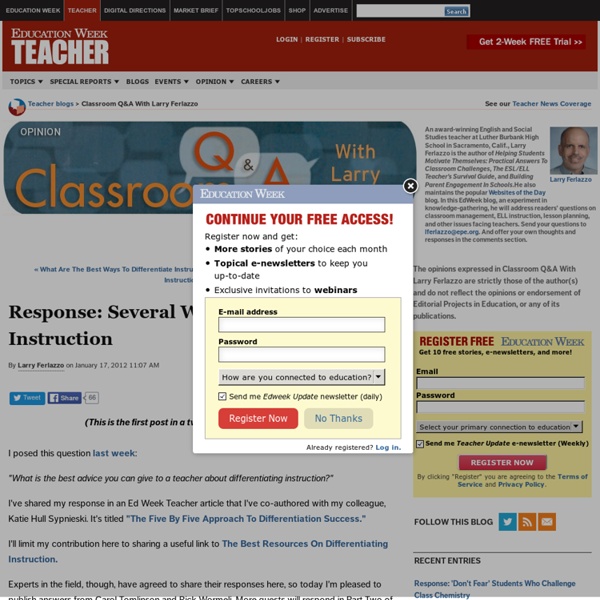Response: Several Ways To Differentiate Instruction - Classroom Q&A With Larry Ferlazzo

Response: More Ways To Differentiate Instruction -- Part Two - Classroom Q&A With Larry Ferlazzo
(This is the second post in a two-part series on differentiation. You can see the first post, which includes responses from Carol Tomlinson and Rick Wormeli, here) I posed this question last week: "What is the best advice you can give to a teacher about differentiating instruction?" I've shared my response in an Ed Week Teacher article that I've co-authored with my colleague, Katie Hull Sypnieski. Today's column includes commentaries from Dr. Response From Dr. Dr. Interested in differentiating instruction in your classroom? * Recognize that differentiation is an approach to teaching and learning, not a list of strategies. * Recognize and celebrate what you already do. * Assess yourself to identify your strengths and areas for growth. * Set reasonable goals/expectations for yourself. * Learn! * Be candid with your students, administrators, and parents about what you are doing. * Find a collaborative group of colleagues with whom you can learn and dialogue. Response From Megan Allen
Differentiating the curriculum
The Policy and implementation strategies for the education of gifted and talented students: Support package: Curriculum differentiation (2004) (pdf 1345kb) provides an introduction to curriculum differentiation for gifted and talented students and is suitable for all stages of schooling. It needs to be read in conjunction with the Policy and implementation strategies for the education of gifted and talented students (revised 2004) and its companion document (2004) (pdf 270kb). The purpose of differentiating the curriculum is to provide appropriate learning opportunities for gifted and talented students. Three important characteristics of gifted students that underscore the rationale for curriculum differentiation (Van Tassel–Baska, 1988) are the capacity to: learn at faster rates find, solve and act on problems more readily manipulate abstract ideas and make connections. The creation of a differentiated curriculum requires some pre-planning. Definitions Article (pdf 25kb) Acceleration Web page
Article List - Differentiation Central
Practical/Application Chapman, C., & King, R. (2005). Eleven practical ways to guide teachers toward differentiation. Journal of Staff Development, 26(4), 20-25. Professional development is a process that needs time to grow and develop. Grigorenko, E. and R. Learning profile adds to our understanding of students' performance and should be taken into account in classrooms in terms of both instruction and assessment. Popham, W. What is the meaning of formative assessments? Sternberg, R. When students are matched to instruction suited to their learning preferences, they achieve significantly better than comparable students whose instruction is not matched to their learning preferences. Sternberg, R., & Grigorenko, E. (2005). Thinking styles are examined as a way to differentiate in the classroom. What works for students at risk: A research synthesis Learning to love assessment Research/Theory Beecher, M., & Sweeny, S. (2008). Bruner, J. (1961). Grigorenko, E. (1997). Hebert, T. (1993).
Oz the Great and Powerful (2013
Homepage - Differentiation Central
Dream Moods A-Z Dream Dictionary
Symbols are the language of dreams. A symbol can invoke a feeling or an idea and often has a much more profound and deeper meaning than any one word can convey. At the same time, these symbols can leave you confused and wondering what that dream was all about. Acquiring the ability to interpret your dreams is a powerful tool. In analyzing your dreams, you can learn about your deep secrets and hidden feelings. To guide you with your dreams interpretations, we have interpreted over 5900 keywords and symbols and over 20,000 different meanings in our ever expanding dream dictionary. Every detail, even the most minute element in your dream is important and must be considered when analyzing your dreams.
Related:
Related:



